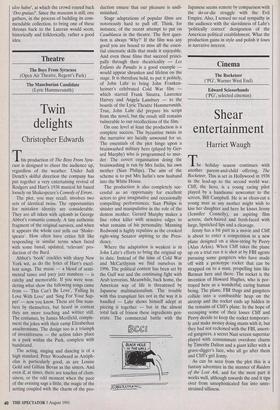Theatre
The Boys From Syracuse (Open Air Theatre, Regent's Park) The Manchurian Candidate (Lyric Hammersmith)
Twin delights
Christopher Edwards
This production of The Boys From Syra- cuse is designed to cheer the audience up, regardless of the weather. Under Judi Dench's skilful direction the company has put together a very entertaining revival of Rodgers and Hart's 1938 musical hit based loosely on Shakespeare's Comedy of Errors.
The plot, you may recall, involves two sets of identical twins. The opportunities for mistaken identity are considerable. They are all taken with aplomb in George Abbot's romantic comedy. A tiny authentic fragment of the original survives, and when it appears the whole cast yells out 'Shake- speare'. How often have critics felt like responding in similar terms when faced with some banal, updated, `relevant' pro- duction of the Bard.
Abbot's 'book' crackles with sharp New York wit, as do the lyrics of Hart's excel- lent songs. The music — a blend of senti- mental tunes and pacy jazz numbers — is catchy and memorable. If you were won- dering what show the following songs came from — 'This Can't Be Love', 'Falling In Love With Love' and 'Sing For Your Sup- per' — now you know. These are fine num- bers by themselves, but heard in context they are more touching and wittier still. The costumes, by James Merifield, comple- ment the jokes with their camp Elizabethan anachronisms. The design too is a triumph of inventiveness — the action takes place in a park within the Park, complete with bandstand.
The acting, singing and dancing is of a high standard. Peter Woodward as Antiph- olus is particularly good, as are Louise Gold and Gillian Bevan as the sisters. And even if, at times, there are touches of clum- siness, or the odd moment when the pace of the evening sags a little, the magic of the setting coupled with the charm of the pro-
duction ensure that our pleasure is undi- minished.
Stage adaptations of popular films are notoriously hard to pull off. Think, for instance, of the recent attempt to put on Casablanca in the theatre. The first ques- tion is always 'Why?' If the film was any good you are bound to miss all the essen- tial cinematic skills that made it enjoyable. And even those films that succeed princi- pally through their theatricality — Les Enfants du Paradis is a good example would appear shrunken and lifeless on the stage. It is therefore bold, to put it politely, of John Lahr to bring John Franken- heimer's celebrated Cold War film which starred Frank Sinatra, Laurence Harvey and Angela Lansbury — to the boards of the Lyric Theatre Hammersmith. True, John Lahr did prepare his script from the novel, but the result still remains vulnerable to our recollections of the film.
On one level at least the production is a complete success. The byzantine twists in the narrative are lucidly unwound for us. The essentials of the plot hinge upon a brainwashed military hero (played by Ger- ard Murphy) who is programmed to mur- der. The covert organisation doing the brainwashing is run by Mrs Iselin, his own mother (Sian Philips). The aim of the scheme is to put Mrs Iselin's new husband into the White House.
The production is also completely suc- cessful as an opportunity for excellent actors to give imaginative and occasionally compelling performances. Sian Philips is sinister and manipulative in the role of the demon mother. Gerard Murphy makes a fine robot killer with sensitive edges to what remains of his personality. Manning Redwood is highly repulsive as the crooked right-wing Senator aspiring to the Presi- dency.
Where the adaptation is weakest is in John Lahr's efforts to bring the original up to date. Instead of the time of Cold War and McCarthyism we find ourselves in 1996. The political context has been set by the Gulf war and the continuing fight with Arab terrorists. Meanwhile, back home, the American way of life is threatened by Japanese multinationalism. The trouble with this transplant lies not in the way it is handled — Lahr shows himself adept at piecing it together — but in the almost total lack of frisson these ingredients gen- erate. The commercial battle with the Japanese seems remote by comparison with the do-or-die struggle with the Evil Empire. Also, I sensed no real sympathy in the audience with the slavishness of Lahr's `politically correct' denigration of the American political establishment. What the production gains in style and polish it loses in narrative interest.


















































 Previous page
Previous page